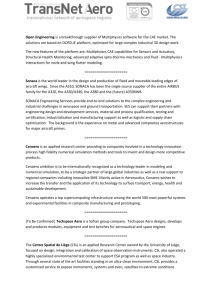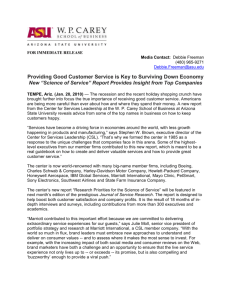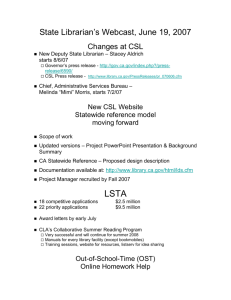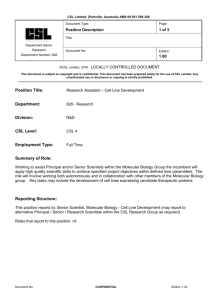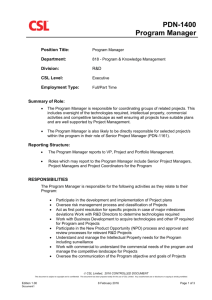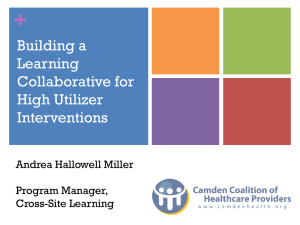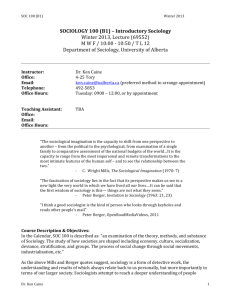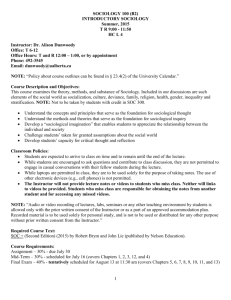SOCIOLOGY 291 Introduction to Environmental Sociology
advertisement
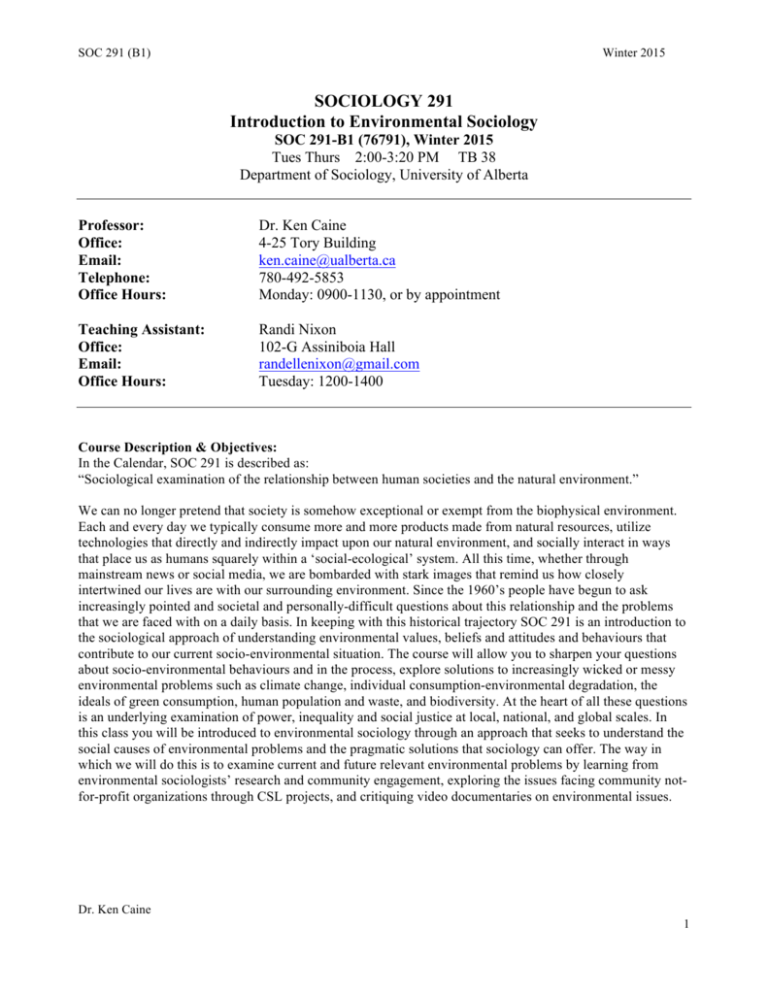
SOC 291 (B1) Winter 2015 SOCIOLOGY 291 Introduction to Environmental Sociology SOC 291-B1 (76791), Winter 2015 Tues Thurs 2:00-3:20 PM TB 38 Department of Sociology, University of Alberta Professor: Office: Email: Telephone: Office Hours: Dr. Ken Caine 4-25 Tory Building ken.caine@ualberta.ca 780-492-5853 Monday: 0900-1130, or by appointment Teaching Assistant: Office: Email: Office Hours: Randi Nixon 102-G Assiniboia Hall randellenixon@gmail.com Tuesday: 1200-1400 Course Description & Objectives: In the Calendar, SOC 291 is described as: “Sociological examination of the relationship between human societies and the natural environment.” We can no longer pretend that society is somehow exceptional or exempt from the biophysical environment. Each and every day we typically consume more and more products made from natural resources, utilize technologies that directly and indirectly impact upon our natural environment, and socially interact in ways that place us as humans squarely within a ‘social-ecological’ system. All this time, whether through mainstream news or social media, we are bombarded with stark images that remind us how closely intertwined our lives are with our surrounding environment. Since the 1960’s people have begun to ask increasingly pointed and societal and personally-difficult questions about this relationship and the problems that we are faced with on a daily basis. In keeping with this historical trajectory SOC 291 is an introduction to the sociological approach of understanding environmental values, beliefs and attitudes and behaviours that contribute to our current socio-environmental situation. The course will allow you to sharpen your questions about socio-environmental behaviours and in the process, explore solutions to increasingly wicked or messy environmental problems such as climate change, individual consumption-environmental degradation, the ideals of green consumption, human population and waste, and biodiversity. At the heart of all these questions is an underlying examination of power, inequality and social justice at local, national, and global scales. In this class you will be introduced to environmental sociology through an approach that seeks to understand the social causes of environmental problems and the pragmatic solutions that sociology can offer. The way in which we will do this is to examine current and future relevant environmental problems by learning from environmental sociologists’ research and community engagement, exploring the issues facing community notfor-profit organizations through CSL projects, and critiquing video documentaries on environmental issues. Dr. Ken Caine 1 SOC 291 (B1) Winter 2015 Course Objectives: 1. Speak to issues relating to the relationship between human beings and the natural world and in doing so introduce students to sociology and its role in understanding environmental issues. 2. Learn and articulate environmental sociological concepts and theories toward developing a deeper understanding of why environmental problems occur and endure. 3. Explore and deeply examine the interrelationship between the local and the global as they pertain to environmental problems or issues through the analysis of an environmental documentary or, if the Community Service-Learning (CSL) Option is chosen, practical application of sociological knowledge to environmental issues in a directed practical project with a community partner not-forprofit organization. 4. Apply a range of methods that sociology offers for making sense of the social world and its articulation with the natural world. 5. Address the sociological underpinnings of conflicts and inequalities around the world that are linked to such issues as natural resource use, food, wilderness preservation, population, and global climate change. Required Textbook: 1. Carolan, Michael. 2013. Society and the Environment: Pragmatic Solutions to Environmental Issues. Westview Press: Boulder, CO. 2. Other readings as assigned. Supplemental readings will be available electronically through Moodle or through Internet links. Note: Policy about course outlines can be found in section 23.4(2) of the University of Alberta Calendar (GFC 29 SEP 2003) Prerequisites: None Anti-Requisite: None Registration: Students are responsible for ensuring they are officially registered. Sign in to Bear Tracks and confirm that you are properly registered in this course and section. You must be officially registered to receive marks: instructors are not allowed to mark the exam of an unregistered student or to add a student name to the official class list. If you have difficulty registering, please go to the Registrar’s office, see your department advisor, or speak with the Sociology Undergraduate Coordinator (5-27 HM Tory Building). As you are confirming your registration, also check that in planning your courses for fall term that you do not have any examination conflicts. On Class Format, Ground Rules & Being Respectful: PLEASE READ! This class follows a lecture format intermixed with audio and video to stimulate thought, illustrate concepts, and provoke and promote discussion. In order to make this format more interactive, I ask that you respect the following ground rules: ê Due to the increasing number of emails I receive requesting information on materials already covered in lecture, I reserve the right to reply that you should speak with your classmates who were in attendance or to come and see me during scheduled office hours. ê I will not provide or discuss any grades through e-mail. Similarly, I will not discuss your course and assignment grades in comparison to other students in the class. Grades can be accessed through the course eClass site, and you can discuss them with me in person during my office hours or by appointment. ê While this should go without saying, I will not increase, ‘upgrade’ or ‘bump up’ your grade at your request at any time in the course. Dr. Ken Caine 2 SOC 291 (B1) ê ê ê ê ê ê ê ê Winter 2015 Cell phones must be turned off or silenced at all times during class and exams. If it is an expected emergency (i.e. family illness, child care issue, etc.) please quietly step out into the corridor before taking the call. Arriving late and/or leaving early disturbs others. If it is unavoidable, sit in a place such that you will create the least disruption – for example if you come in late, sit in the nearest seat or if you have to leave early, find a seat that will allow you to leave with as little disturbance as possible. If coming late or leaving early on a regular basis cannot be avoided, please let me know. Although the class size, physical space, and teaching format make interaction difficult, I expect that students express their views, raise questions, and challenge taken for granted assumptions about society. For this to be possible, it is necessary that we all come to class with an open mind and willingness to listen to other points of views and perspectives that may challenge our own values and ways of thinking. Therefore, whoever is speaking (instructors or fellow students) must be heard in silence. Talking and whispering disturbs others who are listening, and is a sign of disrespect. If you have something to contribute to the discussion, or topic under consideration, share it with the class; otherwise save it for a later and more private opportunity outside of class. I strongly advise regular attendance in class. Students who attend regularly and read the assigned chapters and readings in advance have greater comprehension and retention, and perform better on examinations. Assigned readings and lectures overlap and while not identical, they are complementary and mutually reinforcing. If you decide to not attend class you should be aware of the risk. The University holds students responsible for any information provided during class time. If you will be missing classes occasionally, or regularly, I recommend you find a classmate who is willing to lend you their notes and fill you in on what was missed. My lecture notes will not be posted online, nor will they be provided to you. SOC 291 has an eClass site. If you have access to Bear Tracks, your CCID and Password allows you to access the Moodle course site for SOC 291. The course syllabus will be posted on eClass. If you are having trouble in this class, please come see me sooner rather than later. Sooner – there is a good chance that we can work together to address your problems in the course. Later – there is a good chance that you will be stuck with a lower grade than you would like. Recording of Lectures Audio or video recording (including photos of PPT slides) of lectures, labs, seminars or any other teaching environment by students is allowed only with the prior written consent of the instructor or as a part of an approved accommodation plan. Recorded material is to be used solely for personal study, and is not to be used or distributed for any other purpose without prior written consent from the instructor. Course Requirements: This course offers an optional Community Service-Learning (CSL) component for those students who wish to volunteer, as part of their learning experience, with a community organization. Through CSL, students leave the classroom and engage with local communities to make learning come alive. CSL helps you to make reallife connections between your education and everyday issues in the Edmonton community. As part of CSL courses, students undertake 20 hours of service in one of the different community organizations listed below. • • • • • • • Alberta Public Interest Research Group Canadian Parks and Wilderness Society, Northern Alberta Chapter Growing Food Security in Alberta - GFSA Buzz Policy Working Group Pesticide Free Edmonton Reclaim Urban Farm Westend Food Hub Alliance Edmonton Bicycle Commuters Society (not confirmed yet) Dr. Ken Caine 3 SOC 291 (B1) Winter 2015 For more information, visit the CSL website: http://www.csl.ualberta.ca/en/Students.aspx, or see the Student Guidebook: http://www.csl.ualberta.ca/Search.aspx?q=CSL%20Student%20Guidebook&cx=006931257102525869171:p mw8ng0x-nc&cof=FORID%3A11#1150] Details regarding each organization’s project can be found in the UA ‘CSL Portal’ the link to which has been posted on eClass. Please be advised that placement opportunities are limited and that community partners have exclusive authority in accepting students for their projects. However, prior to contacting a CSL Community Partner, students must first meet with the Instructor and TA to discuss their interests, preferences and objectives. Organizations will not accept applications from students without prior Instructor approval. Special office hours have been set aside for Friday January 9th between 1500-1630, and Monday January 12th between 0900-1030 for students wishing to discuss placements. No appointments will be scheduled during these hours. Students will be seen on a first come, first served basis only. Students opting for the CSL Stream will volunteer a minimum of 20 hours with their chosen community partner organization. Those hours replace time you might normally be spending on other out-of-class activities such as documentary viewing, analysis, and library research on the environmental issue as part of the Research Stream, but the hours you spend on both options are approximately the same. While all students will write a common Mid-term and Final exam as well as contribute to online and in-class discussions, CSL Stream students will submit reflection papers and Research Stream students will submit a written proposal and research term paper. Student in both streams will present their findings to the rest of the class at the end of the term. Overview of Grading and Important Dates for CSL and Research Streams: CSL Stream Research Paper Stream Online Participation/Discussion Class Participation Midterm Exam Critical Reflection Papers Value 10% 10% 20% Important Dates First submission due Feb 7 Second submission due Mar 28 Ongoing Feb 10th, during class time First due: Feb 3 (10%) Second due: Feb 24 (10%) Third due: Mar 31 (10%) 30% Environmental Documentary Critique Research Paper Class Presentation CSL Class Presentation Final Exam Proposal due Feb 3 (5%) Final Paper due Mar 31 (25%) 5% 25% Apr 2 Apr 7 Check Bear Tracks for details Participation (20%) Online Discussion (10%) While participation is expected in class, you will be graded through your involvement in an ongoing online discussion. Your contribution in class will greatly contribute to the written ideas that you present in your online submissions. Based on weekly discussion questions on a given topic from the textbook and lectures, you are expected to contribute regularly to the eClass discussion. I will grade Dr. Ken Caine 4 SOC 291 (B1) Winter 2015 two of your online discussions: (1st) Prior to the Midterm Exam, you will submit a copy of what you feel is your best contribution, for grading; (2nd) The second submission to be graded will be handed in prior to the final exam. Additional information and guidance will be provided on eClass. In-Class Participation (10%) Although some students find discussing topics online easier, a key part of the course is to explore ideas, share ideas, and assignment experiences in a face-to-face social environment. In order to ensure my participation grade is correct for each student, you MUST upload a clear photo of yourself to the eClass site: To upload your photo on eClass, see: “My Profile Settings” …“Edit Profile” … “User Picture” Research Paper Stream: Environmental Documentary Critique – Research Proposal + Paper (5% + 25%) This assignment allows you to decide on an environmental issue that interests you, select a related documentary film, and to critically examine it through a documentary film analysis. The research paper will be between 10-12 pages, double-spaced, 12 font Times New Roman, 1 inch/2.54 cm margins (approximately 3000-3600 words). As well, you will prepare a 2-page proposal (doublespaced, 12 font Times New Roman, 1 inch/2.54 cm margins (approximately 600 words) describing your environmental documentary project. A detailed description of the assignment with accompanying grading rubric will be discussed in class and posted on the eClass site. Late papers will be penalized 10% per day (including weekends), and you will not receive any written comments. Papers not handed in will receive a zero grade. Due Dates: Proposal (February 3); Final Paper (March 31) CSL Stream: Critical Reflection Papers (3 x 10%) All CSL students will submit a total of three reflection papers over the course of the term. These papers allow students to critically reflect on their CSL experiences and how those experiences have contributed to their learning of the subject matter. Each paper will be between 3-4 pages, doublespaced, 12 font Times New Roman, 1 inch/2.54 cm margins (approximately 900-1200 words). All papers must be submitted by the beginning of class on the day they are due. Late papers will be penalized 10% per day (including weekends), and you will not receive any written comments. Papers not handed in will receive a zero grade. Papers submitted more than one week late will not be accepted. Due dates: (1) March 31, (2) February 3, (3) February 24 Examinations Both Midterm and Final examinations use an objective format and consist of multiple-choice questions. Exam questions will be drawn from the textbooks, any materials used in the class period, and lectures you are required to attend. Two weeks prior to the Midterm and Final exams access to sample exam questions and study guide will be made available through the eClass site. If a midterm exam is missed and a satisfactory documented excuse is provided within two days of the midterm exam, a re-write will be undertaken on a date and time chosen by the professor. If the rewrite is missed for whatever reason, the student will receive a zero grade. The final exam cannot be rescheduled. Under extenuating circumstances (as outlined in 23.3.2 and 23.5 of the Calendar) students who cannot write the exam, or cancel their final exam during the exam period, must provide documentation and apply to their Faculty for a deferred exam. If approved by the student’s Faculty and the professor, the Department of Sociology’s Final Exam Rewrite date is scheduled for: Saturday, May 9th, 2015 at 9:00am Dr. Ken Caine 5 SOC 291 (B1) Winter 2015 Grading: I do not grade on a curve. Final grades for SOC 291 are determined using the following contract: Excellent Good Satisfactory Poor Minimal Pass Fail Percentage 96 – 100 91 – 95 85 – 90 80 – 84 75 – 79 70 – 74 66 – 69 62 – 65 58 – 61 54 – 57 50 – 53 0 – 49 Letter Grade A+ A AB+ B BC+ C CD+ D F 4-Point Value 4.0 4.0 3.7 3.3 3.0 2.7 2.3 2.0 1.7 1.3 1.0 0.0 Please note: There is no rounding-up policy in this course. For example, a final course average of 94.2%, 94.5%, or 94.9% all receive a final % grade of 94 (not 95) and thus a letter grade of “A”. Writing Assistance Many students have difficulty writing. Editing each other’s work and carefully editing your own work are ways to improve your writing. I recommend the Effective Writing Resources program from the Academic Support Centre (located in SUB 2-400, Tel: 780-492-2682, website: http://www.uofaweb.ualberta.ca/academicsupport/). Past experience has shown that seeking early help from the Support Centre will avoid the last minute backlog of students needing writing assistance. Another option may be to hire an English tutor from the Department of English (Tel: 780-492-2682). Students with Disabilities or Special Needs: Students who require accommodations in this course due to a disability affecting mobility, vision, hearing, learning, or mental or physical health are advised to discuss their needs with Specialized Support and Disability Services (SSDS), 2-800 SUB, 780-492-3381. Please inform me of any special accommodations recommended by SSDS for your participation in this course. Students registered with SSDS who will be using accommodations in the classroom, or who will be writing exams through SSDS, are required to provide me with a “Letter of Introduction” as early as possible. Those students who need accommodated exams must submit their “Exam Instructions and Authorization” (orange) form at least one week before each exam. Dr. Ken Caine 6 SOC 291 (B1) Winter 2015 COURSE OUTLINE Be aware that this outline of readings may change over the course of the term. You are responsible for attending class, and checking eClass and your email for such notices Class Dates Text/Topic / Readings ***On January 5: You must register for Edward Burtynsky’s Jan 27th Talk. Early registration: http://sustainability.ualberta.ca/Events/SustainabilitySpeakerSeries.aspx *** January 6 Introductions & Course Overview. Reading: Chapter One - Introduction: Individuals, Societies and Pragmatic Environmentalism January 8 Reading: Chapter One - Introduction: Individuals, Societies and Pragmatic Environmentalism CSL Stream presentation January 13 CSL Community Partner Project Presentations January 15 Reading: Chapter Two – Greenhouse Gasses: Warmer isn’t Better January 20, 22 Reading: Chapter Three – Waste: Our Sinks are Almost Sunk January 27 Reading: Chapter Four – Biodiversity: Society Wouldn’t Exist Without It January 28 Wednesday evening – Edward Burtynsky: “The Landscape of Human Systems” International Week (7-9pm) January 29 No Class (in lieu of Jan 28th talk) February 3 Reading: Chapter Five – Water: There’s No Substitute *** Reflection Paper #1 DUE February 3 in class *** *** Enviro-Documentary Research Proposal Due February 3 in class *** February 5 Reading: Chapter Six – Population: A Question of Quantity or Quality? [First Online Discussion Posting Due Saturday (by 2300 hrs), February 7th - via eClass] February 10 Mid-Term Exam February 12 Reading: Chapter Seven – Transportation: Beyond Air Pollution CSL & Enviro-Doc Check-in & Discussion NO CLASSES February 16 – 20: Winter Term Reading Week (Family Day / Winter Term Break) February 24 Reading: Chapter Seven – Transportation: Beyond Air Pollution February 26 Reading: Chapter Eight – Food: From Farm to Fork March 3, 5 Reading: Chapter Nine – Energy Production: Our Sun-ny Prospects *** Reflection Paper #2 DUE February 24 in class *** March 10, 12 Reading: Chapter Ten – Political Economy: Making Markets Fair and Sustainable March 17, 19 Reading: Chapter Eleven – Governance: Biases and Blind Spots March 24, 26 Reading: Chapter Twelve – Inequality and Growth: Prosperity for All Dr. Ken Caine 7 SOC 291 (B1) Winter 2015 [Second Online Discussion Posting Due Saturday (by 2300 hrs), March 28th - via eClass] March 31 Reading: Chapter Thirteen – From our Beliefs to our Behaviours: Pragmatic Environmentalism in Action *** Enviro-Documentary Research Paper DUE March 31st in class *** *** Reflection Paper #3 DUE March 31st in class *** April 2 No Readings. Enviro-Doc Presentations April 7 No Readings. CSL Presentations April 9 No Readings. Last class: Review and Final Discussion Final Exam: Consult Bear Tracks for date/time/location University Policy on Academic Misconduct: “The University of Alberta is committed to the highest standards of academic integrity and honesty. Students are expected to be familiar with these standards regarding academic honesty and to uphold the policies of the University in this respect. Students are particularly urged to familiarize themselves with the provisions of the Code of Student Behaviour (online at www.governance.ualberta.ca) and avoid any behaviour which could potentially result in suspicions of cheating, plagiarism, misrepresentation of facts and/or participation in an offence. Academic dishonesty is a serious offence and can result in suspension or expulsion from the University.” Please familiarize yourself with the “Don’t Cheat” sheet at: http://www.governance.ualberta.ca/StudentAppeals/DontCheatsheet.aspx The U of A considers plagiarism, cheating, misrepresentation of facts and participation in an offence to be serious academic offences. Plagiarism, cheating, misrepresentation of facts and participation in an offence can be avoided if students are told what these offences are and if possible sanctions are made clear at the outset. Instructors should understand that the principles embodied in the Code are essential to our academic purpose. For this reason, instructors will be fully supported by Departments, Faculties and the University in their endeavours to rightfully discover and pursue cases of academic dishonesty in accordance with the Code. 30.3.2(1) Plagiarism No Student shall submit the words, ideas, images or data of another person as the Student’s own in any academic writing, essay, thesis, project, assignment, presentation or poster in a course or program of study. 30.3.2(2) Cheating 30.3.2(2)a No Student shall in the course of an examination or other similar activity, obtain or attempt to obtain information from another Student or other unauthorized source, give or attempt to give information to another Student, or use, attempt to use or possess for the purposes of use any unauthorized material. 30.3.2(2)b No Student shall represent or attempt to represent him or herself as another or have or attempt to have himself or herself represented by another in the taking of an examination, preparation of a paper or other similar activity. See also misrepresentation in 30.3.6(4). 30.3.2(2)c No Student shall represent another’s substantial editorial or compositional assistance on an assignment as the Student’s own work. 30.3.2(2)d No Student shall submit in any course or program of study, without the written approval of the course Instructor, all or a substantial portion of any academic writing, essay, thesis, research report, project, assignment, presentation or poster for which credit has previously been obtained by the Student or which has been or is being submitted by the Student in another course or program of study in the University or elsewhere. 30.3.2(2)e No Student shall submit in any course or program of study any academic writing, essay, thesis, report, project, assignment, presentation or poster containing a statement of fact known by the Student to be false or a reference Dr. Ken Caine 8 SOC 291 (B1) Winter 2015 to a source the Student knows to contain fabricated claims (unless acknowledged by the Student), or a fabricated reference to a source. 30.3.6(4) Misrepresentation of Facts No Student shall misrepresent pertinent facts to any member of the University community for the purpose of obtaining academic or other advantage. See also 30.3.2(2) b, c, d and e. 30.3.6(5) Participation in an Offence No Student shall counsel or encourage or knowingly aid or assist, directly or indirectly, another person in the commission of any offence under this Code. The Truth In Education (T*I*E) project is a campus wide educational campaign on Academic Honesty. This program was created to let people know the limits and consequences of inappropriate academic behaviour. There are helpful tips for Instructors and Students. The following procedures are drawn from the Code of Student Behaviour as approved by GFC and the Board of Governors. The guidelines summarize what instructors must do when they have reason to believe that a student has plagiarized, cheated, misrepresented facts or participated in an offence. 30.5.4 Procedures for Instructors in Cases Respecting Inappropriate Academic Behaviour 30.5.4(1) When an Instructor believes that a Student may have committed an Inappropriate Academic Behaviour Offence [30.3.2] or that there has been Misrepresentation of Facts [30.3.6(4)] or Participation in an Offence [30.3.6(5)] in cases respecting Inappropriate Academic Behaviour in the course that he or she instructs, the Instructor will meet with the Student. Before such a meeting, the Instructor shall inform the Student of the purpose of the meeting. In the event that the Student refuses or fails to meet with the Instructor within a reasonable period of time specified by the Instructor, the Instructor shall, taking into account the available information, decide whether a report to the Dean is warranted. (CLRC 30 MAY 2002) (EXEC 7 APR 2003) (CLRC 27 NOV 2003) 30.5.4(2) If the Instructor believes there has been a violation of the Code, the Instructor shall, as soon as possible after the event occurred, report that violation to the Dean and provide a written statement of the details of the case. The instructor may also include a recommendation for sanction. (CLRC 27 NOV 2003). Possible Sanctions One or more of the following sanctions given in 30.4.3 (2) and (3) of the Code are commonly used for plagiarism, cheating, participation in an offence, and misrepresentation of facts. 30.4.3(2) a.i A mark reduction or a mark of 0 on any term work or examination for reason of Inappropriate Academic Behaviour (GFC 24 SEP 2007); 30.4.3(2) a.ii Reduction of a grade in a course 30.4.3(2) a.iii A grade of F for a course. 30.4.3(2) a.iv A remark on a transcript of 8 (or 9 for failing graduate student grades), indicating Inappropriate Academic Behaviour in addition to 30.4.3(2)a.i, 30.4.3(2)a.ii, 30.4.3(2)a.iii 30.4.3(3) b Expulsion 30.4.3(3) c Suspension The following sanctions may be used in rare cases. 30.4.3(3) e Suspension of a Degree already awarded 30.4.3(3) f Rescission of a Degree already awarded 30.6.1 Initiation of an Appeal 30.6.1(1) When a Student has been found to have committed an offence under the Code of Student Behaviour or an Applicant is found to have committed an offence under the Code of Applicant Behaviour (Section 11.8 of the GFC Policy Manual), whether or not that Student or Applicant has been given a sanction, the Student or Applicant may appeal that decision, except in the case of a decision of the Discipline Officer under 30.5.6(2)e.ii, which remains final and is not subject to appeal. In cases where a severe sanction has been recommended to the Discipline Officer, once the student receives the final decision of the Discipline Officer, the student can appeal the decisions of both Dean and the Discipline Officer at the same time. The written appeal must be presented to the Appeals Co-ordinator in the University Secretariat within 15 Working Days of the deemed receipt of the decision by the Student or Applicant. The finding that an offence has been committed, the sanction imposed or both may form the basis of appeal. The written appeal must also state the Dr. Ken Caine 9 SOC 291 (B1) Winter 2015 full grounds of appeal and be signed by the Appellant. The appeal shall be heard by the UAB. (CLRC 30 MAY 2002) (CLRC 25 SEP 2003) (EXEC 01 MAY 2006) (GFC 24 SEP 2007) (BEAC 17 OCT 2007) Dr. Ken Caine 10
